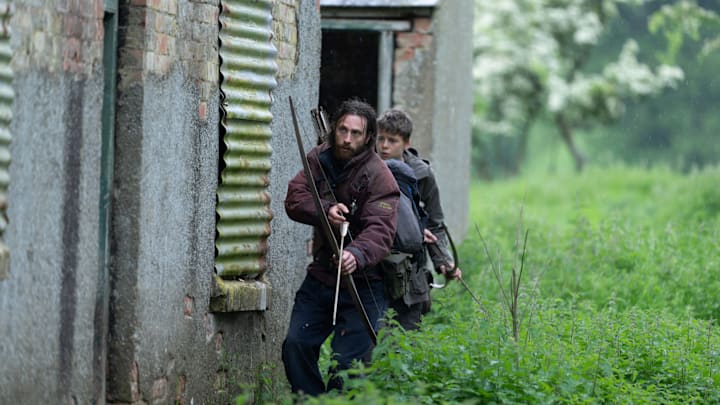Something we don't typically see in zombie movies is the rest of the world functioning as normal. While society collapses entirely in Americanized zombie movies, films in Europe differ. 28 Years Later exemplifies how British-based productions visualize the zombie apocalypse compared to how American media portrays it.

In Danny Boyle's latest flick, the state of affairs remains the same as 28 Weeks Later. A portion of Europe is under quarantine due to the zombie infection that's taken mostly everyone with it. The main characters, however, aren't running from an epidemic anymore. They've settled into a community that provides for itself and has seemingly been doing so for years. Unfortunately, the one thing that they can't procure themselves is animals for food, which brings us to the main characters.
When Spike (Alfie Williams) and his father Jamie (Aaron Taylor-Johnson) venture out, this is when viewers learn that they reside on an island, slightly safe from the dead. They only have a single water-stricken bridge connecting them to the mainland, so there's some level of security to their settlement.
Interestingly, the human survivors have found a middle ground to coexist with the ongoing zombie plague. Plenty of other forms of media come to mind, too, wherein humans fight to survive while the hordes surround them. Though, hardly any of them throw out the potential for coexisting.

Erick's introduction to the story further cements how the world is moving on despite the zombie epidemic in Europe. He speaks to Spike about choosing career paths, specifically how a single decision could've placed him behind the wheel of a delivery van instead of fighting zombies in Scotland. This informs the audience that not everything is as bleak in their universe.
Despite what's transpired and all the death that followed, the world keeps pushing on. The silver lining to an epidemic may be something that more American productions keep in mind. Since we know there'll be more zombie movies in the future, it may be beneficial to change things up a bit.
The difference-maker can be as simple as not conveying an ongoing situation as world-ending. The stakes are always so high in zombie movies that there's never any chance that the world survives. Perhaps it's time one of these flicks gives humanity a chance. A Resident Evil reboot is coming up, standing as an ideal opportunity to alter the narrative. The longstanding franchise frequently reinforced the idea that the world died with the virus' spread. Maybe the reboot writers can place the cure out there for everyone to take. In that scenario, saving humanity wouldn't be so preposterous.
28 Years Later is currently in theaters everywhere.
